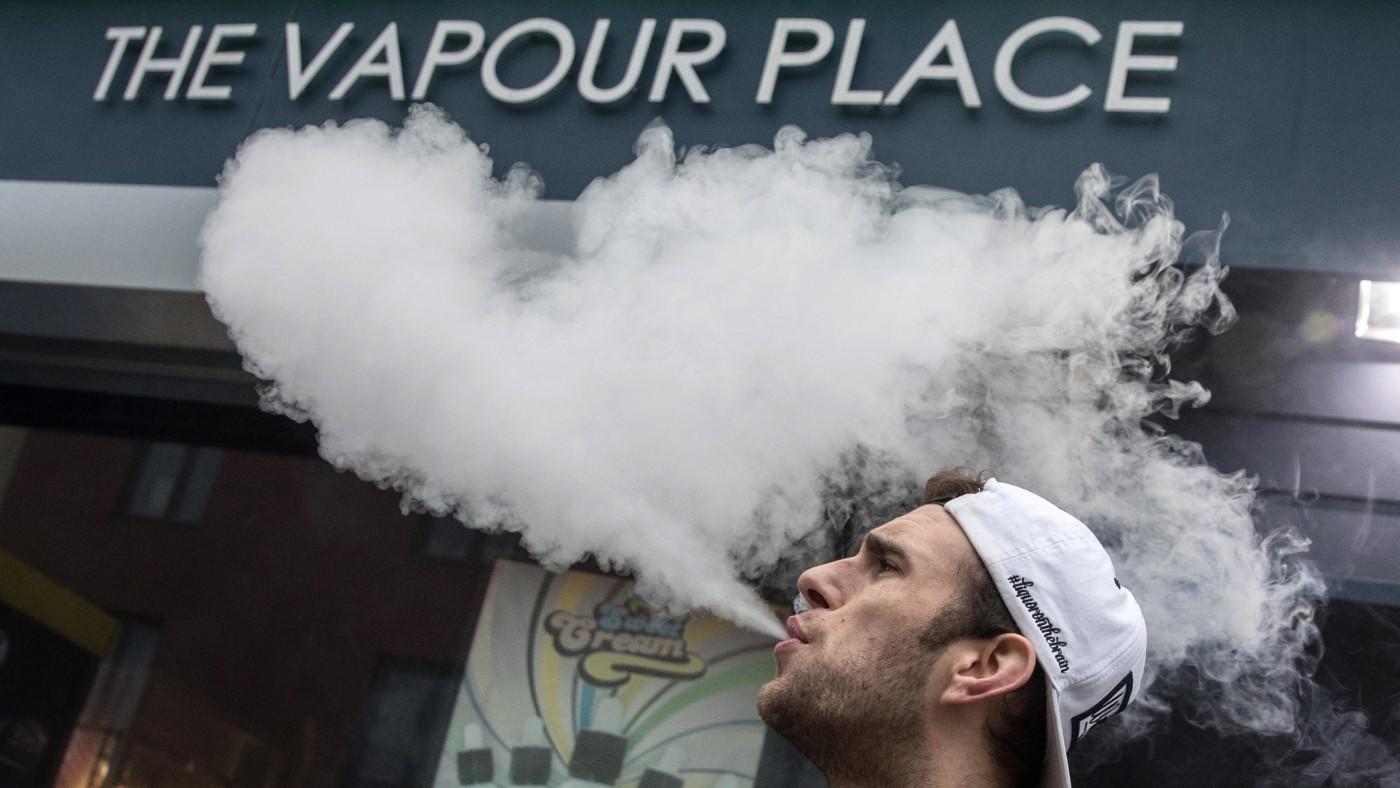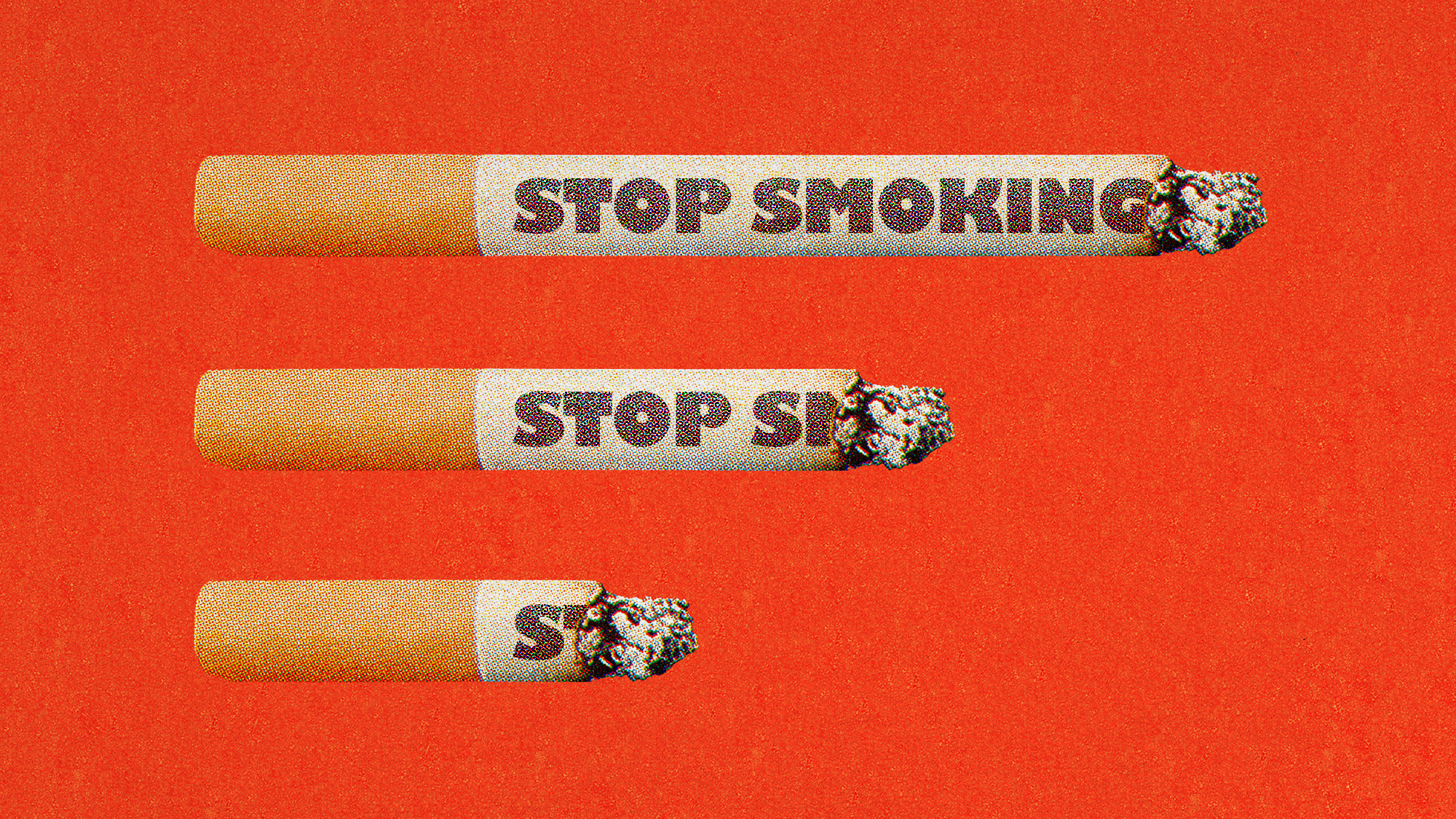The dramatic rise of vaping in the UK
Increasing numbers of children are using e-cigarettes adding to the growing chorus of alarm over the potential impact on public health

A free daily email with the biggest news stories of the day – and the best features from TheWeek.com
You are now subscribed
Your newsletter sign-up was successful
About 4.3 million people in Britain are now estimated to use e-cigarettes, up from 800,000 a decade ago.
The UK vaping market is worth nearly £3bn a year, and is growing by more than 5% annually, according to Statista. While vapes were initially marketed to people who wished to stop smoking, that has now changed entirely: shops selling the devices seem to have cropped up on most high streets, and vapes are now available in an amazing variety of shapes, sizes, colours and flavours, from “lemon tart” to “green gummy bear”.
At the same time, there has been a growing chorus of alarm over the potential impact of vaping on public health. Of particular concern is the fact that increasing numbers of children are using e-cigarettes, thereby placing them at risk of becoming addicted to nicotine: some experts have even warned of a vaping “epidemic” among teenagers.
The Week
Escape your echo chamber. Get the facts behind the news, plus analysis from multiple perspectives.

Sign up for The Week's Free Newsletters
From our morning news briefing to a weekly Good News Newsletter, get the best of The Week delivered directly to your inbox.
From our morning news briefing to a weekly Good News Newsletter, get the best of The Week delivered directly to your inbox.
What exactly does vaping involve?
The modern e-cigarette is generally thought to have been invented by Hon Lik, a pharmacist from Shenyang in northeast China. His device, patented in 2003, contained a liquid form of nicotine that was heated into vapour and inhaled. It was his company, later bought by a subsidiary of Imperial Tobacco, that kickstarted the vaping revolution. Today, e-cigarettes still work in much the same way: battery-powered devices heat a solution of nicotine, propylene glycol or glycerine, and flavourings, to produce a vapour. But they now come in many forms: some devices are refillable; many others are disposable, offering up to 600 puffs before they run out. Some two million single-use vapes are thrown away a week in the UK, and there are now hundreds of different companies offering vapes. The leading brand in the UK is Chinese-owned Elf Bar, which makes disposable e-cigs that are popular among British teenagers; industry giants such as British American Tobacco have also launched their own brands.
Is vaping dangerous?
In a landmark report in 2015, Public Health England concluded that vaping was 95% healthier than smoking, and put it at the forefront of its plans to reduce smoking. This is chiefly because e-cigarettes do not contain cancer-causing tar or carbon monoxide, as cigarettes do. But the claim has proved controversial. Researchers in other countries – particularly America, where vaping has been treated as a serious public health threat – have raised concerns that it can cause lung disease and asthma. Studies in the US have also found that some flavoured e-liquids have been shown to contain carcinogens such as pulegone and formaldehyde. And nicotine is a toxic substance, albeit a mild one, which can cause cardiac problems. The concerns have led about 40 countries – including India, Japan, Singapore, Argentina and Uruguay – to ban the sale of e-cigarettes altogether. But the biggest alarm has been over the rise of vaping among children.
How big is that problem?
E-cigarette use among 11- 17-year-olds has risen dramatically in the UK in recent years. According to the campaign group Action on Smoking and Health (ASH), 20.5% of children aged 11-17 had tried vaping – up from 13.9% in 2020. About 7.6% of them regularly or occasionally use e-cigarettes. Schools report that vaping is increasingly prevalent among pupils; videos of people discussing vaping techniques on TikTok are hugely popular. Many vapes circulating in British schools were found to be illegal and untested, with some containing high levels of nickel, chromium and lead, which can affect the central nervous system and brain development. All this has raised concerns that companies seem to be marketing vapes to teenagers (who cannot legally buy them until they are 18), and that children are getting hooked on the nicotine contained in e-liquids, potentially storing up health problems and acting as a gateway to smoking.
Is the market regulated?
The UK has a pretty laissez-faire regulatory framework for vaping compared with countries such as the US, but there are some restrictions in place. The sale of e-cigarettes to under-18s has been banned since 2015; and since 2016, they’ve been subject to strict limits on advertising. Nicotine levels in vapes are limited to 20mg/ml; some flavourings and ingredients, such as caffeine, are banned; and licensed disposable vapes are limited to 600 puffs. But many regulations go unenforced, and there is a thriving black market for stronger, longer-lasting vapes, particularly the disposable variety. Now there are growing calls for tougher regulation. Proposals currently being considered by ministers include tighter rules on packaging, marketing and flavourings to try to make vapes less appealing to children. A ban on disposable vapes is currently being considered in Scotland, but is not thought to be favoured by Downing Street.
A free daily email with the biggest news stories of the day – and the best features from TheWeek.com
Why the lack of concern?
Smoking is the leading cause of preventable illness and death in the UK. And vaping has been a “phenomenally successful” tool for helping smokers quit, says Linda Bauld, a professor of public health at the University of Edinburgh. Some 6.6 million people in Britain still smoke (13.3% of the population). But that’s much lower than it was a decade ago (20.2% of us smoked in 2011); and it’s also one of the lowest rates in Europe. Vaping, many public health experts say, has helped us reach this level (some point out that countries where smoking remains more prevalent, such as Spain, have lower levels of vaping). Bauld argues that other health challenges, such as childhood obesity, demand more attention. Nevertheless, while thelong-term effects of vaping are not yet clear, many urge caution. Besides, vaping is certainly an environmental issue: 138 million single-use vapes were sold in the UK last year, each containing a small lithium battery.
-
 Key Bangladesh election returns old guard to power
Key Bangladesh election returns old guard to powerSpeed Read The Bangladesh Nationalist Party claimed a decisive victory
-
 Judge blocks Hegseth from punishing Kelly over video
Judge blocks Hegseth from punishing Kelly over videoSpeed Read Defense Secretary Pete Hegseth pushed for the senator to be demoted over a video in which he reminds military officials they should refuse illegal orders
-
 Trump’s EPA kills legal basis for federal climate policy
Trump’s EPA kills legal basis for federal climate policySpeed Read The government’s authority to regulate several planet-warming pollutants has been repealed
-
 Growing a brain in the lab
Growing a brain in the labFeature It's a tiny version of a developing human cerebral cortex
-
 Health: Will Kennedy dismantle U.S. immunization policy?
Health: Will Kennedy dismantle U.S. immunization policy?Feature ‘America’s vaccine playbook is being rewritten by people who don’t believe in them’
-
 Obesity drugs: Will Trump’s plan lower costs?
Obesity drugs: Will Trump’s plan lower costs?Feature Even $149 a month, the advertised price for a starting dose of a still-in-development GLP-1 pill on TrumpRx, will be too big a burden for the many Americans ‘struggling to afford groceries’
-
 Ultra-processed America
Ultra-processed AmericaFeature Highly processed foods make up most of our diet. Is that so bad?
-
 The quest to defy ageing
The quest to defy ageingThe Explainer Humanity has fantasised about finding the fountain of youth for millennia. How close are we now?
-
 Quit-smoking ads are being put out
Quit-smoking ads are being put outUnder the radar The dissolution of a government-funded campaign could lead to more smokers in the future
-
 The battle of the weight-loss drugs
The battle of the weight-loss drugsTalking Point Can Novo Nordisk and Eli Lilly regain their former stock market glory? A lot is riding on next year's pills
-
 An insatiable hunger for protein
An insatiable hunger for proteinFeature Americans can't get enough of the macronutrient. But how much do we really need?